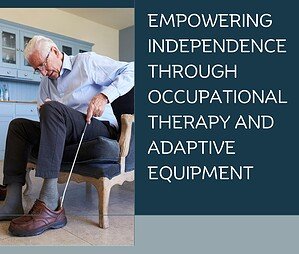HOW PHYSICAL THERAPY CAN HELP YOU RECOVER FROM INJURY OR SURGERY
By Desirée Gagné, MA, OTR/L
Recovery after surgery or injury can be a challenging and often daunting journey, but it’s a path that can be significantly eased and accelerated with the support of physical therapy. Whether you’ve recently undergone a surgical procedure or experienced a debilitating injury, the healing process can benefit immensely from the expertise and guidance of skilled physical therapists. These professionals play a pivotal role in helping individuals regain strength, mobility, and function, ultimately paving the way towards a faster and more complete recovery. Physical therapy can prove to be a vital component of your post-surgery or post-injury rehabilitation, offering a renewed sense of hope and optimism for a healthier, more active future.
Let’s explore how physical therapy can help you recover from injury or surgery in a variety of ways.
Reduce pain and inflammation
Physical therapy is instrumental in reducing pain and inflammation by employing a range of targeted techniques and exercises. Therapists use manual therapies, such as massages and joint mobilization, to alleviate tension and improve blood flow, which can reduce inflammation. Physical therapy also includes modalities like heat, cold, and electrical stimulation, which can further mitigate pain and inflammation.
Improve range of motion
Physical therapists are adept at improving range of motion by employing tailored techniques and exercises. They conduct thorough assessments to identify specific limitations and then design personalized treatment plans. Through a combination of manual therapies, stretching, and strength-building exercises, physical therapists help loosen stiff joints and enhance the flexibility of surrounding muscles.
Strengthen muscles
Physical therapists can help you strengthen the muscles around your injured or surgical site to help support your joint and improve your function. Physical therapists excel at enhancing strength by developing individualized programs to address each client’s unique needs and goals. Through progressive resistance exercises, they systematically challenge muscles, fostering growth and improved endurance. By focusing on specific muscle groups related to a client’s condition, physical therapists facilitate targeted strength gains. They also emphasize proper form and technique to prevent injury and optimize effectiveness. These experts continually assess progress and adjust exercise regimens, ensuring clients build strength safely and effectively, ultimately helping them regain their physical capabilities and enhance their overall quality of life.
Improve balance and coordination
Physical therapists can help you improve your balance and coordination to reduce your risk of falls and injuries. Physical therapists are skilled at enhancing balance and coordination through specialized exercises and targeted interventions. They tailor treatment plans to address an individual’s specific needs, whether it’s related to injury, aging, or a medical condition. These plans often include exercises that challenge balance and stability, helping to strengthen the core and improve proprioception. Additionally, therapists may use equipment like balance boards or balls to create controlled challenges that enhance coordination. By progressively adjusting the difficulty of exercises, physical therapists enable clients to regain and even surpass their previous levels of balance and coordination, ultimately improving their mobility and reducing the risk of falls or accidents.
Teach you how to use assistive devices
If you need to use assistive devices such as crutches, a cane, or a walker, physical therapists can teach you how to use them safely and effectively. They offer guidance on selecting the right device and ensure it is properly fitted to the individual’s needs. Furthermore, physical therapists provide comprehensive training and education on how to use these devices safely and efficiently. They teach techniques for mobility and transfers helping clients regain independence and confidence. By working closely with physical therapists, individuals can maximize the benefits of assistive devices and adapt seamlessly to their use, facilitating a smoother transition and improving their overall quality of life.
Educate you about your injury or surgery
Physical therapists can provide you with education about your injury or surgery, including how to prevent complications, promote healing, and instruct you in home exercise programs. They help clients understand the causes of their injuries or the reasons behind their surgical procedures, which promotes a sense of control and empowerment. Additionally, physical therapists offer guidance on post-operative care, exercise regimens, and lifestyle modifications to facilitate healing. By imparting knowledge and clear instructions, they enable clients to actively participate in their recovery, make informed decisions, and take steps towards a successful rehabilitation journey.
********************
Physical therapy can help you recover from injury or surgery more quickly and completely. Studies have shown that people who participate in physical therapy after surgery have better outcomes than those who do not. Additionally, Physical Therapy before an operation will often deliver substantial advantages.
Here are some specific examples of how physical therapy can help you recover from common injuries and surgeries:
Knee injury:
Physical therapy can help you regain your range of motion, strengthen your muscles, and improve your balance and coordination after a knee injury.
Back surgery:
Physical therapy can help you strengthen your core muscles, improve your flexibility, and learn how to move safely after back surgery.
Shoulder injury:
Physical therapy can help you regain your range of motion, strengthen your muscles, and improve your stability after a shoulder injury.
Hip replacement surgery:
Physical therapy can help you learn how to use your new hip, improve your range of motion, and strengthen your muscles after hip replacement surgery.
If you are recovering from an injury or surgery, talk to your doctor about whether physical therapy is right for you. A physical therapist can develop a personalized treatment plan to help you achieve your recovery goals.
If you would like more information on the benefits and value of Physical Therapy, contact Rehability in Spring Hill FL, at 352-701-0494 for a complimentary consultation.
DISCLAIMER: This article is intended to provide general health information and is not intended to provide individual-specific medical advice, diagnosis, or treatment.



